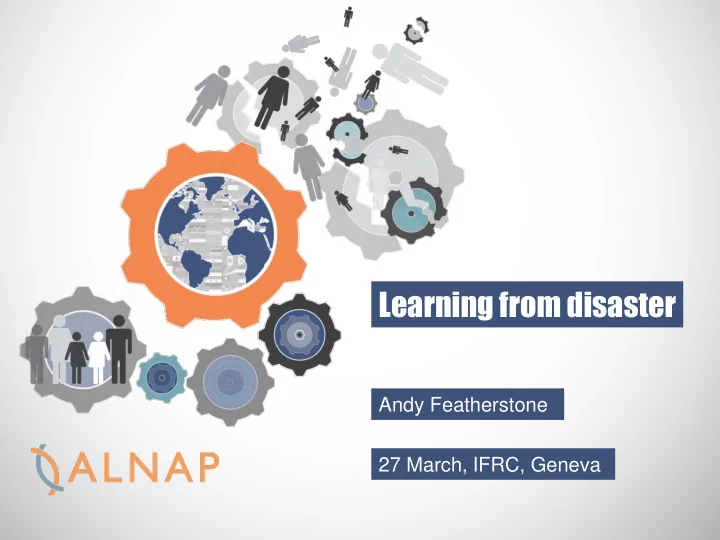

Learning from disaster Andy Featherstone 27 March, IFRC, Geneva
Purpose of the study To explore the ways NDMAs and other state actors learn about and improve their humanitarian response activities with a view to identifying: • Current practices • Challenges that exist • How collaboration has helped overcome these challenges
Approach • The research builds on ALNAP’s ongoing engagement with NDMAs • Participation of 5 NDMAs and input from representatives of international organisations and regional institutions • Extensive web-based literature review with a focus on NDMA websites
Context • The state has responsibility to respond to humanitarian crises • Engagement of international organisations is dependent on the states willingness and capacity to respond • The international humanitarian system has a poor track record of engaging with the state but efforts are being taken to address this
Cycle of Learning
Generating knowledge NDMA approaches • After action reviews and evaluations , formal and informal reflections and simulations Areas of collaboration After action reviews, simulations Evaluation
Organising knowledge NDMA approaches • Capacity assessments and online knowledge repositories Areas of collaboration Capacity assessment, knowledge repositories
Sharing knowledge NDMA approaches • Staff capacity development, peer learning, Disaster Management Institutes, guidelines, codes of conduct and minimum standards Areas of collaboration Staff capacity development, peer learning
Enablers & inhibitors of learning Inhibitors • Lack of resources • Competition for influence • Prioritisation of short-term planning horizons Enablers • Continuity of support • Shared agendas and trust • ‘windows of opportunity’ and profile
Recommendations for NDMAs • Strengthen capacity for and uptake of after action reviews and evaluation • Use the post-disaster window of opportunity to for legislative change • Use learning outputs to increase NDMA profile within government • Engage in peer support with other NDMAs
Recommendations for others • Strengthen links between NDMAs and the international humanitarian system • Promote joint humanitarian evaluation • Establish long-term strategic partnerships that develop capacity and enhance visibility • Learn from holistic, multi-stakeholder approaches to institutional strengthening of NDMAs
Q& A session • Political difficulty of learning process for governments. We need to find a way to learn without political risk (from OXFAM) • Role of regional organisations, in particular ASEAN in learning and training? (Swiss mission) • Any study to understand difficult relationship between governments and international actors? (Intersos) • New obligation to conduct 9 to 12 months evaluation for any disaster above level 3 (from IASC Secretariat) • Let’s learn together rather than point out each other to learn (SCHR) • Any tool to quantify results of evaluation? (Libya mission)
Thank you
Recommend
More recommend